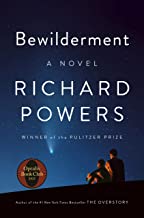Bewilderment by Richard Powers 2021
This is one of those books that when I finished it, I had to immediately sit down and write my review in order to process it and figure out how I felt about it. The ending was an emotional tsunami and left me unsettled and a bit off balance—-perhaps, bewildered is the best description.
‘Bewilderment’ is Powers’ 13th novel, and I can no longer describe him as I have in past reviews, as American literature’s best kept secret. The word is out. A MacArthur awardee, he won the National Book Award in 2006 and then quietly and mostly under the radar, turned out more wonderful books. The secret got out last year when he won the Pulitzer for ‘Overstory’, a much acclaimed and widely read book. ‘Bewilderment’ has been reviewed by every major periodical and is short listed for the Booker and long listed for the National Book Award—–so much for my secret favorite novelist!
What Powers has accomplished is to do what great fiction aims for: create a believable world peopled with believable characters that one comes to care about and whose actions, feelings, and outcomes we readers have privileged access to gaining in wisdom, empathy, connection. In this book, Powers creates not just one world, but dozens of them as the main character, the widowed astrobiologist Theo Byrne struggles to engage and save his nine year old son, Robin, a boy who most would describe as ‘on the spectrum’. While his doctors and teachers urge medication for Robin’s temper outbursts and inattention which have become serious after the death of his mother in an auto accident, Theo is unwilling to drug his son who he knows is not ‘sick’ but rather, ‘special’ (“….everyone alive on this fluke little planet was on the spectrum. That’s what a spectrum is.”). Theo engages Robin through deep interactions with the natural world and by creating fictional planets which he describes in detail to Robin in place of the more mundane bedtime stories the rest of us read or tell our children/grandchildren.
The book hurtles along as Theo and Robin struggle to stay intact in a world that is afflicted by man’s destruction of the planet as well as by a trump-like, tweeting autocrat in the White House. We move from an experimental MRI based treatment of Robin, to Theo’s Congressional testimony, to a disastrous camping trip in the Smokies with page-turning speed. I was left wiped out and heart-broken by the ending.
I typically don’t read other reviews of books that I’m reviewing until after I’ve written mine and in this case, I held to that despite the front page review in the NYT Sunday Book Review, Globe, WSJ, Guardian, and others. One review that I did read was by Dwight Garner in the NYT in which the he describes the book as ‘so meek, saccharine, and overweening in its piety about nature that even a teaspoon of it numbs the mind….As fiction, the novel is D.O.A.—shallowness that requests to be taken seriously. There are some books that you want to give to your best friend; this is one to give to your distant aunt.’ Really, Dwight, what did you really think? I respectfully and wholeheartedly disagree!
The science is interesting and theoretically achievable. The cosmology is probably pretty accurate. The characters and plot are terrific, so what’s the problem? Read it and see with whom you agree.



